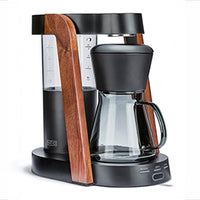Stop Blaming the Beans — It Might Be Your Water
You bought fresh, high-quality beans. Your grinder is dialed in. You nailed your pour, timing, and brew temperature. And yet... something tastes off. Bitter, flat, or weirdly sour.
Before you blame the roaster or give up on that expensive bag, consider this: the problem might not be the coffee. It might be your water.
Water makes up over 98% of a cup of coffee — and yet, it’s one of the most overlooked variables in brewing. The right water can elevate your coffee’s flavors; the wrong one can mute, distort, or overpower them.
Let’s dig into how water affects coffee, why your tap might be ruining your cup, and how to fix it.
What’s Actually in Your Water
All water is not created equal. Even clear, odorless tap water can contain minerals, chemicals, or impurities that interfere with flavor.
Key components to pay attention to:
-
Calcium & magnesium: Essential minerals for flavor extraction, but too much causes bitterness or scaling
-
Chlorine & chloramine: Common in municipal water, these disinfectants make coffee taste chemically or dull
-
Iron or sulfur: Can create metallic or rotten-egg flavors
-
Total dissolved solids (TDS): Measures everything in your water — high or low TDS both pose problems
Most tap water falls outside the ideal range for brewing coffee, even if it tastes fine on its own.
Why Bad Water Makes Good Coffee Taste Wrong
Brewing coffee is a chemical extraction — water pulls soluble compounds from ground coffee. That means:
-
Too soft (low mineral): Water under-extracts, producing sour, weak cups
-
Too hard (high mineral): Water over-extracts or masks delicate notes
-
Chlorinated: Chemical taste and muted aromatics
-
Inconsistent TDS: Makes your brews unpredictable day to day
The same coffee brewed with great water can taste brighter, more balanced, and far more complex.

The Ideal Water Profile for Coffee
According to the Specialty Coffee Association (SCA), ideal brewing water has:
-
Calcium hardness: 50–70 ppm
-
Magnesium hardness: 10–20 ppm
-
Total alkalinity: 40 ppm
-
TDS (total dissolved solids): 75–150 ppm
-
pH: Close to 7 (neutral)
-
No chlorine or odors
You don’t have to memorize these — just know that “neutral, lightly mineralized, and clean-tasting” is the target.
How to Test Your Water at Home
You can get a good snapshot of your water quality with a few tools:
-
TDS meter: Affordable and easy — tells you how much stuff is in your water
-
Water hardness test strips: Available at pet stores or online
-
Smell and taste: Chlorine and sulfur are detectable even without tests
Or just contact your local water provider for a report — most publish water quality data online.
Quick Fixes for Better Brew Water
If your water isn’t ideal (and most isn’t), you have a few options:
1. Use filtered water
A basic carbon filter (like a Brita) can remove chlorine, sediment, and some taste issues.
2. Buy bottled water
Look for brands with moderate mineral content (like spring water), not “purified” or distilled.
3. DIY mineral blends
You can buy coffee-specific mineral packets (like Third Wave Water) to mix with distilled water for perfect control.
4. Install a home filtration system
For serious coffee lovers, this ensures consistency and protects your brewing gear from scale.
Why Good Water Protects Your Gear Too
Bad water doesn’t just affect taste — it affects your machine.
-
Scale buildup from hard water clogs pipes and ruins heating elements
-
Corrosive water can damage metal parts
-
Chlorine residue breaks down rubber and seals
Brewers like those from Ratio Coffee are engineered for precision — but their performance depends on water quality. Clean, balanced water protects your investment and your flavor.
If you’re constantly descaling or experiencing inconsistent brew strength, check your water before blaming your setup.
Water: The Silent Flavor Shaper
Most people don’t think of water as an ingredient — but in coffee, it’s the main one.
You wouldn’t cook pasta in wine or mix orange juice into soup. So why brew premium beans with subpar water?
Once you taste the difference clean, balanced water makes, you’ll never want to go back. Suddenly that “meh” coffee becomes vibrant. Your delicate notes emerge. Your brew becomes clear.
Don’t just chase better beans. Chase better water. Your cup depends on it.
Frequently Asked Questions
Can I use distilled water for coffee?
No — it’s too pure. Coffee needs some minerals for proper extraction. Use distilled only if you're adding your own minerals (like Third Wave Water).
Is bottled water better than tap for brewing?
Often yes — if it's natural spring water with moderate mineral content. Avoid distilled or overly purified water with zero minerals.
How often should I test my water?
If you notice flavor changes or new equipment problems, test it. Otherwise, check seasonally or if you move to a new area.
Does water quality really make that much of a difference?
Absolutely. Water alters how coffee extracts — it’s the single biggest hidden variable behind flavor inconsistency.
 Ratio Eight S2
Ratio Eight S2
 Ratio Eight Original
Ratio Eight Original
 Ratio Six
Ratio Six
 Ratio Four
Ratio Four
 Compare Machines
Compare Machines






